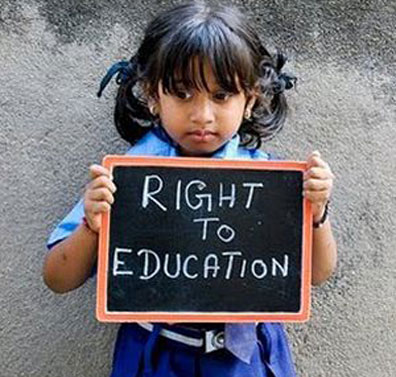Being a media student, the RTI (Right to Information Act) features a lot in our academics. We even have seminars about the RTI and how it is an important tool to a journalist. True that, it is very important, I wouldn’t deny one bit. But there is this other important act that sounds much like the RTI, but not many people are aware of it. The other day, I went to a respected media person to discuss my dissertation topic and used the word ‘RTE’. I was flabbergasted when the next question came “What is RTE?”
The Right to Education Act came into effect 2 years ago on the 1st April, 2010. The implementation period was three years hence. But, 2 and half years down, people are not completely aware about the act and its intricacies.
The Right of Children to Free and Compulsory Education (RTE) means that every child from the age of 6-14 has a right to full time elementary education of satisfactory and equitable quality in a formal school which satisfies certain essential norms and standards. This act is not just about enrolling children in school or abolishing child labor. It is also about improving the quality of schools and teachers, curriculum vice and infrastructure wise.
It also makes provisions for a non-admitted child to be admitted to an age appropriate class to avoid various student psychological issues. It states that there shall be no punishment and screening tests for admission. In short, the act is beautiful. But the greatest threat this act faces right now is that the beauty is only refrained to paper.
In reality, the implementation of this act is far from getting completed in the next 6 months.
The current literacy rate in India is 74.04%. Considering the population is 1.21bn, at least 40 million people in this country are illiterate. That is more than the population of some countries. Literacy forms an integral part of the development of the nation. Government today, is very much concerned about economic development than human development.
What can be done with an economically developed nation where more than 40 million people are not educated? Even when India becomes economically ‘developed’ there would be a shallow area left behind.
Like Gandhiji said, “ends do not justify means”
So, there is an immediate necessity to educate India. A very easy way to do it would be rigorous implementation of the Right to Education Act. The whole purpose of RTE is to bring a child to school. But in most parts of the country, Child Labor and bonded labor is a bane. When the children do manage to come back to schools, the teachers who are not appropriately trained reprimand them and there is a huge list of drop outs.
The RTE also provides for properly qualified teachers and no punishments in school. But when it comes to ground reality, most schools in rural India have ‘anganwadi’ volunteers who when children can’t be handled by words use the stick.
The schools also provide for provision of proper classrooms, buildings, toilets, etc. But many schools lack these. Children are taught under the trees in deserted bunglows. In many schools there are no toilets because of which girls do not attend school during their ‘time’ in the month. In some places, the construction of proper school buildings has started but stopped half way through for many petty reasons.
Another thing that should be included in the Act is the provision of Mid-Day meals. Some schools don’t receive these mid-day meals regularly. Some children who come to schools only to eat and not stay hungry like their parents, find no reason to attend school.
Some of the situations above might sound ridiculous and impossible. But they’re all true. This type of scenario can be avoided only if the Government organizations concentrate more on the RTE Act, spread awareness about it and work towards its implementation.
After all, education is the most powerful weapon which you can use to change the world.
Writer is a student at SIMC



